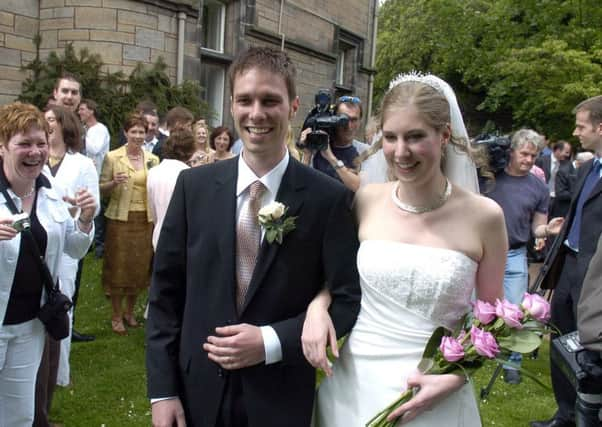Scottish couples who have humanist weddings less likely to divorce


New figures show that people who wed in the non-religious ceremonies have a greater chance of staying together than couples who marry in Roman Catholic, Church of Scotland and civil ceremonies.
Humanist weddings have been legal in Scotland since 2005 and are now more popular than Church of Scotland and Roman Catholic weddings combined. They have not been legalised in England and Wales.
Advertisement
Hide AdAdvertisement
Hide AdStatistics from the Scottish Courts and Tribunals Service (SCTS) show couples married in humanist ceremonies were three times less likely to divorce than Roman Catholic marriages, more than two times less likely to divorce than Church of Scotland marriages and almost four times less likely to divorce than civil marriages.
An analysis of divorce rates for 2017/18 showed that for marriages that have taken place in the past five years humanist weddings had a divorce rate of 1.7 in every 1,000, whereas civil ceremonies were 7.3.
The Church of Scotland divorce rate for marriages less than five years old was 5.8 in 1,000 and for Roman Catholic weddings it was five.
A similar pattern was found for couples married between five and 10 years and between 10 and 15 years.
The figures were obtained from the Scottish Courts and Tribunals Service (SCTS) in a freedom of information request from Humanists UK.
Andrew Copson, chief executive of Humanists UK, said: “These figures show what a good start for couples a humanist wedding can be and they deserve a lot of attention.
“A humanist ceremony is an opportunity for couples to have a completely bespoke, completely unique day that reflects their beliefs and values.
“Humanist weddings are deeply personal, with a unique ceremony crafted for each couple by a celebrant that gets to know them well and ensures that their script and vows reflect precisely who they are and the commitment they are making to each other.
Advertisement
Hide AdAdvertisement
Hide Ad“I think that’s what gives it the strength and resilience that it has.”
Humanist Society Scotland Chief Executive Gordon MacRae said: “Scotland should be proud of leading the way in allowing freedom for couples to choose a humanist marriage.
“In 2005 there was opposition in Scotland to allowing couples the choice of a humanist ceremony as a “passing fad”. The growth in popularity that now sees Humanist Society Scotland celebrants officiate more marriages than the Church of Scotland has closed any such claim.
‘These new government statistics on divorce also reveal that humanist marriages are the most likely to result in a couple staying together. Humanist ceremonies have a clear focus on the the people at the heart of the relationship and their own personal commitments.”
In 2017-18, the last year full figures are available, there were 5,702 humanist marriages in Scotland.
There were 3,166 Church of Scotland ceremonies and 1,182 Roman Catholic weddings.
The most common type of wedding was a civil ceremony, of which there were 14,702.
Rev Norman Smith, convener of the Mission and Discipleship Council, said the Church of Scotland’s wedding services were also personal and denied the type of ceremony was a factor in divorce rates.
Advertisement
Hide AdAdvertisement
Hide AdHe said: “There are many factors in marriage that affect divorce rates, including age, socio-economic status, children, and whether partners have been married before.
“Without understanding many of the variable factors affecting divorcing couples, any suggestion of causation between type of ceremony and divorce rate is entirely spurious.”
Peter Kearney, spokesman for the Catholic Bishops’ Conference of Scotland, claimed Humanist weddings had not been around long enough to draw meaningful conclusions.
He said: “The average length of marriages in Scotland is around 30 years. Humanist marriages have been available for around 13 years. It will be at least 17 years before we can determine whether humanist marriages last any longer than religious marriages.
“Clearly the Catholic Church and the Church of Scotland have been marrying couples throughout living memory, between them they have married hundreds of thousands of Scots.
“The Humanists by comparison have married around 30,000 Scots, an extremely small pool of potential divorcees compared with the churches and a statistically insignificant dataset upon which to base any meaningful conclusions.”
The figures comes as a new poll by YouGov found that almost seven in 10 British adults support legally recognising humanist weddings in England and Wales.